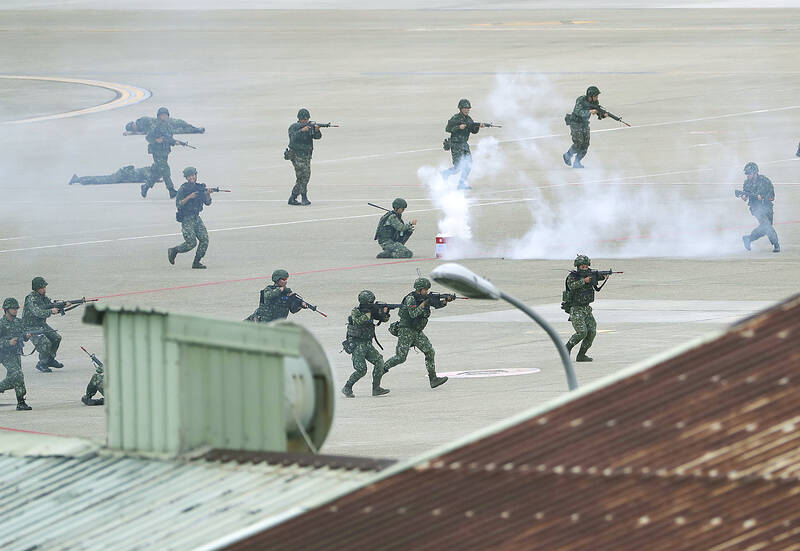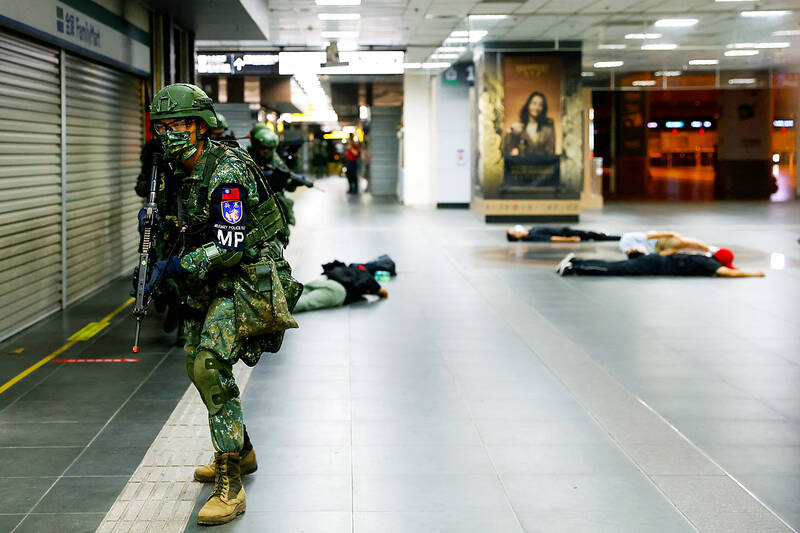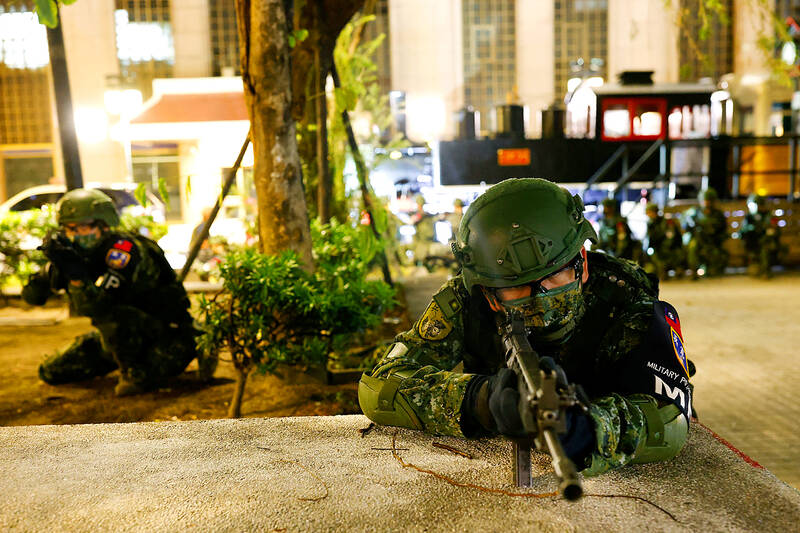The military yesterday conducted its first anti-takeover drill at Taiwan’s major international gateway in Taoyuan to test its ability to fend off a Chinese invasion, as the nation’s annual live-fire Han Kuang exercises continued.
At Taiwan Taoyuan International Airport, members of the Aviation Special Forces Command and Army Airborne Special Forces posed as “red” invading forces and “blue” ground troops deployed to repel the takeover, the Ministry of National Defense said.
The exercise was designed to test the armed forces’ cross-branch coordination and emergency response capabilities during a simulated Chinese invasion, the ministry said.

Photo: Ann Wang, Reuters
During the 40-minute drill, the red team arrived at the airport in four UH-60 Black Hawk helicopters and engaged in a simulated attack, while the blue team — consisting of army soldiers, aviation police officers and airport firefighters — defended the airport.
The red team also simulated a bomb attack at the airport, and firefighters on the blue team used two Oshkosh Striker 3000 firefighting vehicles to extinguish the explosives, the ministry said.
Similar drills had previously been staged at airports in Taiwan, but never at the nation’s busiest civilian airport in Taoyuan.

Photo: AP
When the ministry first announced the exercise earlier this year, Minister of Transportation and Communications Wang Kwo-tsai (王國材) said it would last an hour and potentially affect at least 61 flights and more than 4,000 travelers.
Yesterday, the drill was cut to 40 minutes, with the defense ministry saying it was done so that no scheduled flight would be delayed or affected by the exercise.
Taiwan Taoyuan International Airport live flight data showed that no commercial planes left a gate between 9:19am and 9:55am, and only one landed between 9:09am and 10:14am, indicating that the airport was not handling commercial traffic for about 40 minutes.

Photo: Reuters
The military was also scheduled to hold an emergency landing and takeoff drill at a civilian airport in southeastern Taiwan on Tuesday as part of the Han Kuang exercises, but it was canceled on Monday due to Typhoon Doksuri, which was expected to affect the south.
The planned drill at Taitung Fengnian Airport, the first of its kind since the airport opened in 1981, would have involved F-16 jets and C-130H Hercules transport aircraft, the defense ministry said.
The live-fire component of this year’s Han Kuang exercises started early on Monday.

Photo: Reuters
The annual military drills, which have served as Taiwan’s major war games since 1984, consist of live-fire exercises and computerized war games, and are meant to test the military’s combat readiness in the face of a possible Chinese invasion.
This year’s tabletop exercises were staged in May.
Meanwhile, the military and civilian police joined forces early Wednesday for a hostage crisis and bomb threat drill for the first times at the Taipei Main Station, as part of the ongoing live-fire part of the Han Kuang military exercises.
The drill, held on Wednesday morning around 2 a.m. in one section of Taipei Main Station, one of Taiwan’s busiest transportation hubs, involved a mock hostage taking of civilians by hostile forces.
After being informed about the situation by metro police, military police from the nearby 211th battalion under the 202nd Military Police Command, along with officers from the Taipei Police Department, arrived at the scene.
After eliminating the abductors, the police then discovered a mock explosive device and dispatched a bomb squad to detonate it.
In addition, before the Taipei Main drill, the 202nd Military Police Command held a round of exercises involving the blockading of a bridge around midnight, which simulated the prevention of enemy forces advancing into Taipei City from nearby New Taipei City.
Working together with Taipei Wanhua District police forces and civilian defense units, military police used roadblocks to set up spot-check sites at Wanban Bridge —that connects New Taipei’s Banqiao District with Taipei’s Wanhua District — to stop enemy forces traveling into Wanhua, which is only ten minutes away from the Presidential Office Building and Taipei Main Station, as well as other key political and economic infrastructure.

ENDEAVOR MANTA: The ship is programmed to automatically return to its designated home port and would self-destruct if seized by another party The Endeavor Manta, Taiwan’s first military-specification uncrewed surface vehicle (USV) tailor-made to operate in the Taiwan Strait in a bid to bolster the nation’s asymmetric combat capabilities made its first appearance at Kaohsiung’s Singda Harbor yesterday. Taking inspiration from Ukraine’s navy, which is using USVs to force Russia’s Black Sea fleet to take shelter within its own ports, CSBC Taiwan (台灣國際造船) established a research and development unit on USVs last year, CSBC chairman Huang Cheng-hung (黃正弘) said. With the exception of the satellite guidance system and the outboard motors — which were purchased from foreign companies that were not affiliated with Chinese-funded

PERMIT REVOKED: The influencer at a news conference said the National Immigration Agency was infringing on human rights and persecuting Chinese spouses Chinese influencer “Yaya in Taiwan” (亞亞在台灣) yesterday evening voluntarily left Taiwan, despite saying yesterday morning that she had “no intention” of leaving after her residence permit was revoked over her comments on Taiwan being “unified” with China by military force. The Ministry of the Interior yesterday had said that it could forcibly deport the influencer at midnight, but was considering taking a more flexible approach and beginning procedures this morning. The influencer, whose given name is Liu Zhenya (劉振亞), departed on a 8:45pm flight from Taipei International Airport (Songshan airport) to Fuzhou, China. Liu held a news conference at the airport at 7pm,

Taiwan was ranked the fourth-safest country in the world with a score of 82.9, trailing only Andorra, the United Arab Emirates and Qatar in Numbeo’s Safety Index by Country report. Taiwan’s score improved by 0.1 points compared with last year’s mid-year report, which had Taiwan fourth with a score of 82.8. However, both scores were lower than in last year’s first review, when Taiwan scored 83.3, and are a long way from when Taiwan was named the second-safest country in the world in 2021, scoring 84.8. Taiwan ranked higher than Singapore in ninth with a score of 77.4 and Japan in 10th with

GRIDLOCK: The National Fire Agency’s Special Search and Rescue team is on standby to travel to the countries to help out with the rescue effort A powerful earthquake rocked Myanmar and neighboring Thailand yesterday, killing at least three people in Bangkok and burying dozens when a high-rise building under construction collapsed. Footage shared on social media from Myanmar’s second-largest city showed widespread destruction, raising fears that many were trapped under the rubble or killed. The magnitude 7.7 earthquake, with an epicenter near Mandalay in Myanmar, struck at midday and was followed by a strong magnitude 6.4 aftershock. The extent of death, injury and destruction — especially in Myanmar, which is embroiled in a civil war and where information is tightly controlled at the best of times —